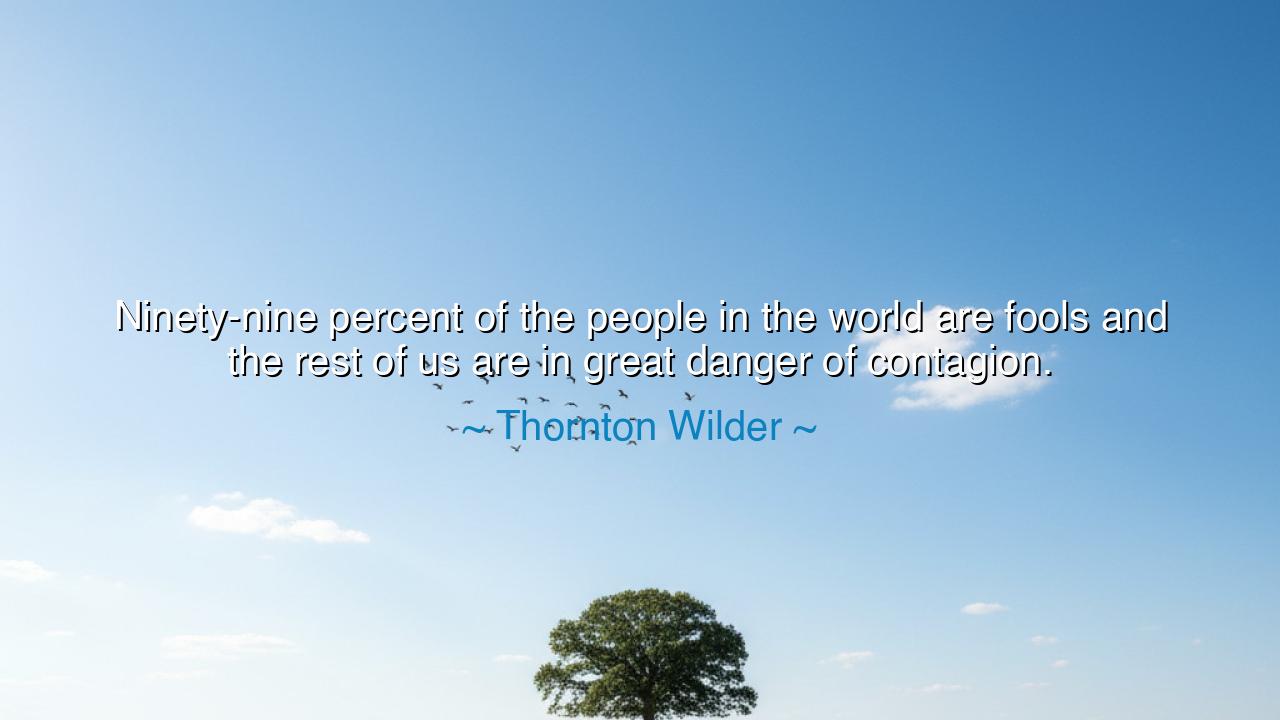
Ninety-nine percent of the people in the world are fools and the
Ninety-nine percent of the people in the world are fools and the rest of us are in great danger of contagion.






“Ninety-nine percent of the people in the world are fools, and the rest of us are in great danger of contagion.” Thus spoke Thornton Wilder, playwright, philosopher, and observer of the fragile comedy of human life. In this piercing statement, cloaked in irony and wisdom, Wilder reveals an eternal truth about the condition of mankind — that folly is not merely a defect of the few, but a disease that spares almost no one. It is the folly of ignorance, of arrogance, of the blindness that comes from believing one already knows. And even those who see it are not safe, for to live among fools is to risk becoming one.
The ancients, too, knew this danger well. The wise Socrates, when praised as the wisest man in Athens, replied, “I know only that I know nothing.” For he understood that wisdom begins where self-assurance ends. The fool, however, is certain — certain of his opinions, his knowledge, his righteousness. Wilder’s quote is not a condemnation born of superiority, but a warning born of humility: that in a world dominated by vanity and noise, even the wise must guard their minds from corruption. To dwell among fools is to breathe their air, and if one is not careful, to think their thoughts.
Folly, in its essence, is not stupidity — it is the refusal to question. The fool does not ask, “Is this true?” but only, “Do others believe it?” He finds comfort in the crowd and safety in conformity. From this soil grow the evils of every age — mobs, tyrannies, blind faith, and moral decay. History is filled with such examples: how the people of Athens condemned Socrates for questioning them; how the masses once burned those they called witches; how countless nations have followed madmen into war. Wilder’s words, then, are not cruel — they are prophetic. They remind us that humanity’s greatest peril lies not in malice, but in unthinking obedience.
There is a kind of contagiousness in folly, as Wilder says — a spiritual disease that spreads through imitation and approval. When truth becomes uncomfortable, the fool laughs at it. When wisdom demands effort, the fool turns away. The wise person, surrounded by such minds, must take care not to grow weary or cynical. Many a philosopher has fallen into despair, and many a thinker has been consumed by scorn. But the true guardian of wisdom must learn to walk among fools without absorbing their folly, to see ignorance without hating it. The cure for foolishness is not contempt, but awareness.
In every age, there have been a few who resisted the contagion — who remained clear while others raged. Galileo, standing before his inquisitors, refused to deny what he knew of the stars. Rosa Parks, in quiet defiance, refused to yield her seat to ignorance disguised as law. These are the souls who saw the world’s madness and did not bend to it. They remind us that wisdom is not inherited; it must be chosen anew each day. For even the wisest heart, if it stops seeking truth, begins to decay into folly.
Wilder’s warning, though sharp, carries hope. If folly spreads through imitation, then so does wisdom. If the fool infects through noise, the wise can heal through silence and example. One candle may seem weak amid the darkness, yet it can light a thousand others. The wise must therefore not isolate themselves, but engage — gently, patiently, and with compassion. To teach without arrogance, to question without cruelty, to live with integrity even when surrounded by deception — these are the weapons against the contagion of foolishness.
So, my child, take this teaching to heart. Guard your mind as you would your health. Do not mistake the noise of many for the truth of one. Seek the company of those who question, who doubt, who think. Read deeply, speak carefully, and learn endlessly. And when you must walk among fools — as all of us must — walk with patience, not pride. For every fool was once ignorant, and every wise man once blind. Remember always Wilder’s lesson: that folly is the natural state of humankind, but awareness is the cure. To be wise is not to escape the contagion of foolishness, but to live in the world without letting its madness claim your soul.






AAdministratorAdministrator
Welcome, honored guests. Please leave a comment, we will respond soon